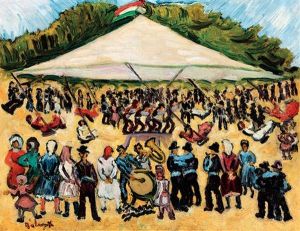Rezso Balint Paintings
Rezső Bálint was a Hungarian neurologist and psychiatrist, born in 1874. Despite being primarily recognized in the medical field, his contributions to the study of neurology and his influence on the understanding of nervous system disorders have earned him a place in the broader historical discussion on the intersection of medicine and the early developments of neuroscience. Bálint’s work is notably remembered for his description of a peculiar syndrome, now known as Bálint's syndrome, which is characterized by a specific type of visual disturbance.
Bálint's early education and career development were deeply rooted in the rich intellectual and cultural milieu of late 19th and early 20th century Hungary, a period when the country was part of the Austro-Hungarian Empire. This context was pivotal for Bálint, offering him a diverse academic environment that was conducive to innovative medical research. After completing his medical studies, Bálint devoted himself to the field of neurology, showing a particular interest in the pathology of the brain and how it affected cognitive functions and behavior.
Throughout his career, Bálint published numerous articles and studies that explored various aspects of neurology, but his most significant contribution came in 1909 when he first described the syndrome that would later bear his name. Bálint's syndrome is characterized by the inability of patients to perceive the visual field as a whole, severe difficulties in visually grasping objects, and a disorientation in relation to objects in space, despite having relatively intact visual acuity. This discovery not only expanded the understanding of visual processing disorders but also contributed to the development of neuropsychology as a discipline.
Despite his profound contributions to neurology and psychology, Bálint's work was somewhat overshadowed by the tumultuous events of the early 20th century, including World War I and the subsequent political changes in Hungary. Nevertheless, his legacy persists in the medical community, particularly among neurologists and neuropsychologists who continue to study and treat conditions related to his research.
Rezső Bálint passed away in 1927, leaving behind a legacy that bridges the worlds of neurology and psychology. His pioneering work on Bálint's syndrome and his broader contributions to understanding the human brain have secured his place in the annals of medical history.

























